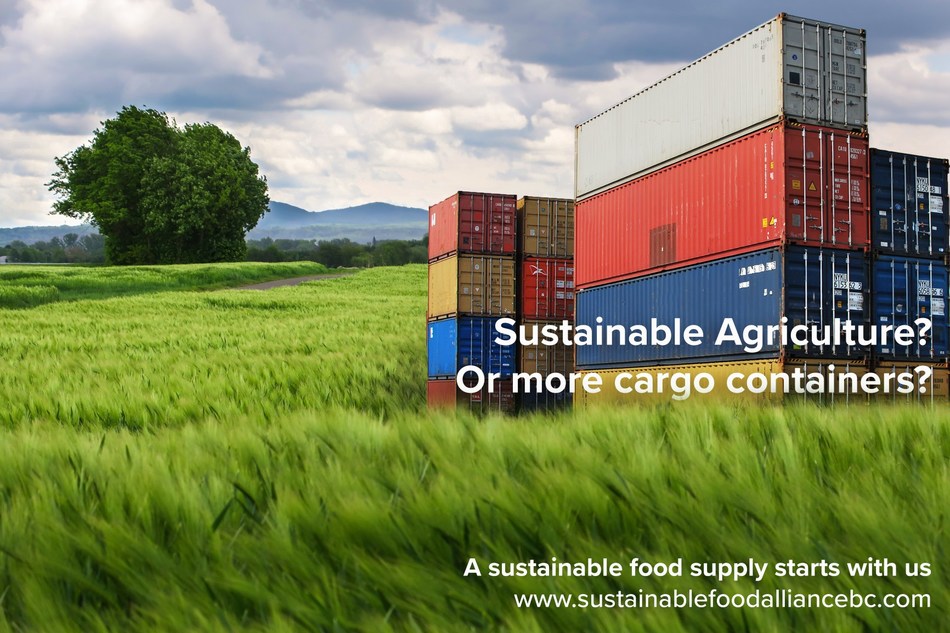Port’s contingency plan for cargo container expansion threatens domestic food security, thousands of jobs and climate change targets
The Port of Vancouver’s decision to prioritize cargo container expansion over British Columbia’s agricultural industry puts the viability of the region’s food sector at risk. By favouring a contingency plan for a massive cargo container terminal on the south shore of Vancouver Harbour, the Sustainable Food Alliance of BC believes the Port is needlessly jeopardizing the operational future of West Coast Reduction – a processor and bulk shipper that provides critical services to thousands of food sector businesses.

“Today we’re raising the alarm over a serious threat to our agriculture sector, due to misguided land use priorities at the Port of Vancouver that put contingency plans for a huge container terminal over a family business that makes an integral contribution to our membership,” said Ken Ingram, Executive Director of the Sustainable Food Alliance of BC.
The Port of Vancouver’s refusal to grant West Coast Reduction a modest extension to its lease, simply to hold the land as a possible future terminal for overseas cargo containers, is creating needless risk for agricultural producers, and threatening the long-term viability of the domestic food system.
“The collective voice of our industry is clear,” added Ingram. “The Port must prioritize the needs of our local agricultural sector, the people of BC and our climate, over a back-up plan for a container terminal that puts our industry at risk. That’s why we’re appealing to the Government of Canada to recognize the vital importance of West Coast Reduction’s role in Canada’s agricultural supply chain. By providing them with a modest lease extension at their long-time terminal location, they can continue to support our members, keep processing local and sustainable, and not force cost increases in these unprecedented times.”
For over five decades, Sustainable Food Alliance of BC members have relied on the processing and international market access provided by West Coast Reduction, which diverts agricultural and food waste from local landfills, and recycles these materials into ingredients for biofuels, pet food, livestock feed and soap. West Coast Reduction’s operation at the Port of Vancouver is the largest supplier of feedstock for biofuel production in Western Canada, and the only facility in the region able to perform this integral role. It is also an essential conduit for farmers to access international markets for canola oil and tallow exports.
“We ask that the Port of Vancouver work with West Coast Reduction to secure certainty over their operating tenure, and by extension, provide certainty to the many families and businesses in our industry that rely on this company – from Indigenous and non-Indigenous commercial fish harvesters in coastal communities to seafood processing companies in Metro Vancouver,” said Chris Sporer, Executive Director of the Seafood Producers Association of BC.
“West Coast Reduction’s Port of Vancouver operation is an essential enabler of clean fuel sector growth in the decades ahead,” added Ian Thomson, President of Advanced Biofuels Canada. “The loss of this facility would set Canada back decades in the development of a competitive clean fuels sector.”
The Sustainable Food Alliance of BC is working with its members, as well as appealing to the public for support on this issue. Western Canadian residents interested in supporting the agricultural sector can send a message to local Members of Parliament and the Federal Ministers of Transportation, Agriculture and Environment. More information is available at SustainableFoodAllianceBC.com/act-now.
Important Facts
- From its strategic location at the Port of Vancouver, our integral rendering and bulk shipping member West Coast Reduction provides vital and value-added services to farmers in Manitoba, Saskatchewan, Alberta and British Columbia – connecting homegrown Canadian products like canola and ingredients for biofuel to international markets.
- West Coast Reduction produces valuable products from more than 250,000 metric tonnes of solid waste every year that would otherwise go to landfill. That represents 50 per cent of the solid waste that Metro Vancouver would otherwise have to dispose of in the region. BC would face a significant solid waste problem without this company’s services.
- West Coast Reduction handles half of Canada’s canola oil exports bound for Asia Pacific markets and 20 per cent of national canola oil exports.
- West Coast Reduction’s strategic location at the Port of Vancouver is the only facility in Western Canada able to refine and blend feedstocks that meet specifications required by biofuel producers – helping meet both federal and provincial greenhouse gas reduction targets.
About SFABC
The Sustainable Food Alliance of BC represents more than 20 interconnected organizations in poultry, dairy, fish, beef, pork, egg, canola, feed, rendering and biofuel production across the province. We represent a diverse cross-section of the agricultural and agri-foods industry – primary products, by-products and food-derived energy – and work collaboratively on areas of common interest in support of a sustainable and resilient food sector. Not only do we divert organic waste from landfills, and help keep food prices accessible, we support domestic and international trade, employ thousands of workers, and support climate change targets through the production of innovative biofuels.
SustainableFoodAllianceBC.com

